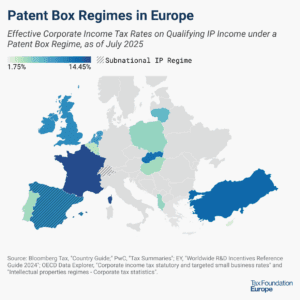
EU Likely to Pause on Digital Tax Push
2 min readBy:According to reports from Politico and other news agencies there is no path to agreement among EU countries on the European Commission’s digital services tax (DST) proposal. For the DST to be adopted at the EU level, unanimity among the 28 EU member states is required. Throughout the debate on this proposal, though, several countries have consistently voiced concerns and it is currently unlikely that the policy will be adopted.
The proposal is for a complex taxA tax is a mandatory payment or charge collected by local, state, and national governments from individuals or businesses to cover the costs of general government services, goods, and activities. on revenue that would tax some large tech firms differently than other firms. It would be levied at 3 percent, would apply to certain digital activities connected to user data, and would be a significant burden on firms that operate on thin margins or run losses.
Ireland and Sweden have been the most vocal with their concerns and Denmark and Finland have been standing with them in opposition to the policy. Some of their concerns focus on the DST’s deviation from sound tax principles and the need for broader international agreement prior to the EU acting on its own.
[global_newsletter_inline_widget campaign=”//TaxFoundation.us1.list-manage.com/subscribe/post?u=fefb55dc846b4d629857464f8&id=6c6b782bd7&SIGNUP=ITCI”]
At different points this fall, various concessions or compromise proposals were offered by the proponents of the DST. A recent possible compromise would have been to simply delay the implementation of the DST until a certain date if broader international agreement on digital taxation was not achieved. From the view of the policy’s opponents, though, simply changing the implementation date does not solve the problems of the underlying policy.
The DST proposal has been widely criticized. Many countries around the world have been pursuing various approaches to taxing digital firms, including some EU countries. Countries like the UK, Spain, and Italy are likely to continue to pursue their own versions of a DST despite no agreement at the EU level.
EU finance ministers are set to meet in Brussels on Tuesday, December 4th. That meeting will likely be the conclusion of this current debate. However, because of the efforts that some countries are undertaking, the meeting on Tuesday is unlikely to be the full conclusion of the discussion. The OECD is pursuing some sort of consensus solution on digital taxation as part of BEPS Action 1.
As the debate continues about how to implement tax policies in the context of digitalization, it is important for policymakers to follow sound principles of tax policy rather then allow politics to drag the policy along behind. For now, at the EU, the political push for the DST has hit a pause in the face of principled opposition.
Share this article




